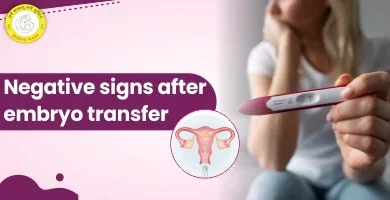What Are the Most Common Causes of Female Infertility?

It is not easy to get pregnant, and carrying a pregnancy is a complex problem. Infertility can occur for many different reasons. The following list does not include the most common causes of female infertility. Talking to your doctor about possible treatments is a good idea for a woman having trouble getting pregnant or carrying a child to term.
Understanding Female Infertility
In this Article
Infertility is a condition that affects the ability to become pregnant or give birth to a baby. This is most common in heterosexual couples (man or woman) after one year of trying. However, it may be diagnosed earlier, depending on other factors. Half of the causes of infertility in heterosexual couples are due to a male problem, and the other half is due to a woman’s issues. One-third is due to a combination of unknown and known reasons. If the cause of infertility is determined to be from the female partner, this is called female infertility (or “female factor”) infertility.
Most Common Causes of Female Infertility
1. Pelvic Inflammatory Disease (PID) from STDs
If you don’t treat sexually transmitted diseases, it can cause fertility problems. For example, Cervical Mucus & Fallopian Tube Issues
2. Ovulation Disorders
Data show that infertility is the leading cause for females, accounting for 40% of all cases. Many factors can cause this, including thyroid disease, hormonal imbalance, aging, certain gynecological disorders, and hormonal imbalance. Primary ovarian impairment (POI) is the most common. This condition is known as premature ovarian failure (POI) and polycystic ovary syndrome (PCOS). Both cases can cause ovulation to be irregular and stop altogether for several months.
3. Polycystic Ovary Syndrome (PCOS)
PCOS is a major cause of female infertility. The hormonal imbalance can cause cysts on the ovaries and impede ovary development. The PCOS Awareness Association states that approximately 10% of women of childbearing age are affected by PCOS. However, less than half of these women are aware and diagnosed.
4. Lifestyle Factors: Weight, Stress, & Toxins
Being overweight can increase your chances of miscarriage and raise your risk for infertility. You may also be at high risk of fertility problems extreme exercise, eating disorders, and stress to hormonal imbalances. Note that losing 5% body weight improves ovulation in obese women.
5. Cervical Mucus & Fallopian Tube Issues
Cervical mucus is a fluid that the cervix secretes when estrogen stimulates production. It allows sperm to survive in the acidic, hostile environment of the vagina. abnormal cervical mucus blocks sperm and how tubal blockages prevent egg-sperm interaction. Mention treatments like IUI (intrauterine insemination).
6. Age-Related Decline in Ovarian Reserve
Stress that fertility drops sharply after 35 due to reduced egg quantity/quality. Use terms like “advanced maternal age” and “low AMH levels.”
Preventing Female Infertility: Key Strategies
For your reproductive health, your overall health matters. Therefore, give yourself healthy and long life. Follow this prevention to stay healthy.
1. Maintain a Healthy Weight
The risk of ovulation disorder also occurs due to being overweight and underweight. To maintain an average weight, exercise every day, but intense, challenging exercise for more than five hours a week can also cause ovulation.
2. Avoid STDs & Practice Safe Sex
To protect against future infertility, prevent unplanned pregnancy. It also reduces the risk linked with any pregnancy and the risk of unsafe abortion. These contraceptive methods protect the female body against HIV infection and STIs.
3. Quit Smoking & Limit Alcohol
In various ways, female fertility occurs due to smoking habits. Smoking habits will damage the overall health of the developing fetus. If you want to get pregnant, then avoid smoking and also alcohol.
4. Reduce Stress
It is proved in some research that couple who has psychological stress will have a bad outcome with infertility treatments. Before having a baby, you have to reduce the stress from your life.
When to Seek Help: Fertility Testing & Treatment
Unfortunately, the most common causes of female infertility cannot be prevented. Maintaining healthy habits can increase your chances of getting pregnant. Regular exercise, sleeping well, and avoiding stress are all things that can help improve your chances of becoming pregnant. Avoid smoking, alcohol, and drug use, and limit your exposure to environmental toxins. It is essential to maintain a healthy weight as it can affect your chances of getting pregnant.
If you have trouble conceiving, then consult with Fertility Center in Patna. Although it can seem daunting to take the first step, we will help you navigate each step. We will help you choose the right path. We look forward to being part of your journey toward parenthood.
Conclusion
If you or your partner are facing any infertility issues, then you must visit the Diwya Mamta Fertility Centre. Our experienced team of gynecologists is dedicated to providing world-class treatment and expert care to help women overcome infertility. Our doctors try for excellence and serve the same quality in reproductive care and the greatest danger of conception.
FAQs
How to prevent infertility in females?
While you can’t prevent all types of infertility, maintaining a healthy lifestyle, avoiding harmful substances, and seeking medical attention when needed can reduce your risk.
Remember: This information is general. Always consult a healthcare professional for personalized advice.
How to test if a woman is infertile
Determining infertility involves a comprehensive evaluation:
Ovulation Tracking: Checking if you’re ovulating regularly.
Hormone Tests: Assessing hormone levels related to fertility.
Ultrasound: Examining reproductive organs for abnormalities.
Hysterosalpingography (HSG): Evaluating fallopian tube health.
Semen Analysis: Assessing male partner’s fertility.
Other Tests: Based on specific symptoms or medical history.
Signs you can’t get pregnant
While not definitive, these signs could suggest infertility:
Inability to conceive: After a year of trying without contraception.
Irregular or absent periods: Hormonal imbalances may affect ovulation.
Painful periods: Could indicate underlying reproductive issues.
Pelvic pain: Might signal problems with reproductive organs.
Note: These are just potential signs. A doctor can provide an accurate diagnosis.
Drugs that cause infertility in females
Some drugs linked to infertility include:
Chemotherapy drugs: Used for cancer treatment.
Certain hormonal medications: Like those for endometriosis or polycystic ovary syndrome (PCOS).
Some antibiotics: In rare cases.
Important: Always consult your doctor about potential side effects of medications.
Infertility causes in male
Common causes of male infertility include:
Hormonal imbalances: Affecting sperm production.
Sperm problems: Low count, poor motility, abnormal shape.
Obstructions: Blocking sperm from leaving the body.
Infections: Affecting the reproductive system.
Varicocele: Enlarged veins in the scrotum.
Types of infertility in females
Main types of female infertility:
Ovulation disorders: Irregular or no ovulation.
Fallopian tube problems: Blockages or damage.
Uterine factors: Abnormalities in the uterus.
Endometriosis: Growth of uterine tissue outside the uterus.
Pelvic inflammatory disease (PID): Infection of the reproductive organs.
Premature ovarian failure: Early menopause.
Unexplained infertility: No identifiable cause.
Remember: This information is for general knowledge. Always consult a healthcare professional for diagnosis and treatment.
Can PCOS be cured to get pregnant?
PCOS can’t be cured but managed with weight loss, medications, and IVF.
How do I check for blocked fallopian tubes?
HSG test or laparoscopy.



